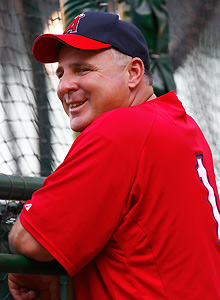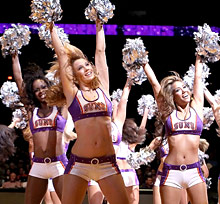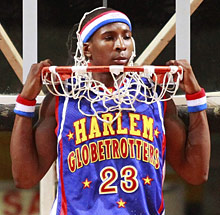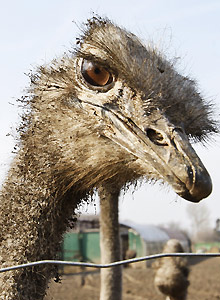For the past 21 years our company has lived by the motto “Have Fun, Make Money.” In our quest to do both in equal measure we have had more than our share of laughs. Pranks and comedy in general are deeply woven into the fabric of our culture and we wouldn’t have it any other way. While we know we are quite different from most organizations, we also know that we are not the only ones to make work fun. As such, we found the following article very entertaining and think you will as well.
Original article can be found
http://sports.yahoo.com/mlb/news?slug=sh-sciosciaprankstermanager030211
TEMPE, Ariz. – The boss hands out assignments during an early morning meeting. Players come back with the Harlem Globetrotters, more toys than Santa Claus and, in one instance, an 8-feet-tall ostrich and a palpitating pitcher.
It’s been this way with the Los Angeles Angels going on 12 seasons, ever since Mike Scioscia became manager. Links-loving pitcher Jered Weaver(notes) was told to report back on every golf course within 50 miles of the team’s spring training complex with a map pasted on poster board. Math-hating pitcher John Lackey(notes) had to re-take a college algebra final he’d failed nine years earlier, the exam hand-delivered to the clubhouse by two Arizona State professors. Two heavy metal-loving rookies were dispatched to Medieval Times to find the link between the music and the Middle Ages.
 Mike Scioscia has a .550 winning percentage and six playoff appearances in 11 seasons as the Angels’ manager.
Mike Scioscia has a .550 winning percentage and six playoff appearances in 11 seasons as the Angels’ manager.
(Getty Images)Of all the mind games played by managers to increase clubhouse cohesion, none are as outlandish – or against type – as Scioscia’s. He tries to generate engagement among new teammates, to foster unity in a diverse clubhouse, to lay groundwork for friendship and trust that can withstand the rigors of an eight-month journey. And even if it doesn’t always work, it does make for a tapestry of great stories.
A few days ago, pitchers Matt Meyer and Ryan Chaffee were told to construct a fielder’s glove and a catcher’s mitt from scratch. They began with a visit to a leather shop.
“I never realized what went into making a glove,” Meyer said. “What Scioscia has guys doing is crazy.”
 Scioscia sent shy rookies to interview Phoenix Suns cheerleaders.
Scioscia sent shy rookies to interview Phoenix Suns cheerleaders.
(Getty Images)“Crazy” and “Scioscia” are used in the same sentence only by the players who see him behind closed doors. To the public, he is no-nonsense, giving signs and yelling at umpires from the dugout with the countenance of a drill sergeant. But at 9:30 a.m. meetings each day during spring training, Scioscia is imaginative and hilarious. He is the prankster manager. The assignments he gives players in the name of camaraderie and team unity are legendary, and they are ongoing.
“It’s a show every morning,” outfielder Torii Hunter(notes) said. “Guys are falling on the floor laughing. Not everybody can take over a room. You can tell Mike Scioscia has it in him. He has the character of a comedian.”
Ron Roenicke, a key member of Scioscia’s coaching staff for 11 years before becoming manager of the Milwaukee Brewers this season, says his former boss is “the funniest man in baseball.”
Scioscia downplays his impact, suggesting that harmony develops among the disparate personalities and ethnic backgrounds when players clear their own throats and report back on their assignments. “The best meetings happen when my voice is minimal,” he said.
 Bud Black
Bud BlackShy rookies were told to interview Phoenix Suns cheerleaders and write about their personal histories. Veteran outfielder Vernon Wells(notes), new to the Angels and under contract for $86 million the next four years, was told to pick out less well-heeled fellow newcomers and buy them dinner. A few years ago the bilingual Scioscia sent English-speaking rookie Brandon Wood(notes) to dinner with Spanish-speaking youngsters Erick Aybar(notes), Kendry Morales(notes) and Alberto Callaspo(notes). Wood was told to speak only Spanish; the others only English. They all gave a gu-busting report the next morning.
“We use the meeting time to humanize the game,” Scioscia said. “The clubhouse is veterans’ turf. We understand that [19-year-old prospect] Mike Trout(notes) seeing Torii Hunter or [top pitching prospect] Garrett Richards seeing Jered Weaver can be intimidating. Everybody has fun together and young guys are forced to come out of their shell.”
Scioscia recalls Dodger team meetings more than 30 years ago run by manager Tommy Lasorda, a motivational genius with a theatrical bent.
 The Harlem Globetrotters paid a visit to Angels spring training in 2010.
The Harlem Globetrotters paid a visit to Angels spring training in 2010.
(Getty Images)“I was 19 years old in the clubhouse with old-school guys like Reggie Smith, Davey Lopes and Dusty Baker,” he said. “Tommy had me step up and talk about myself in front of everyone. You had to present yourself and say something.”
Roenicke, Joe Maddon of the Tampa Bay Rays and Bud Black of the San Diego Padres are Scioscia’s disciples. All four were on the Angels’ staff from 2000 through 2005, which included the team’s lone World Series title in 2002. Maddon and Black, like Scioscia, have been managers of the year. All are highly respected. And all utilize a hybrid of their mentor’s morning meetings.
Maddon, like Scioscia, uses visual aids to communicate. Pitcher David Price hopped into a drill with catchers a few days ago, so Maddon put a set of catcher’s gear in his locker the next day and made him wear it while going through drills. The Rays will hold a talent show March 15, and entries range from the serious to spoofs.
Black and Roenicke also draw on their experiences with Scioscia without being blatantly derivative.
“I picked up a lot of tricks from Mike,” Black said. “Mike is so extremely witty, quick to the punch, a great thinker on his feet in those meetings. A lot of team-building goes on. We talk baseball and what we’re going to do, but also we have a lighter side to our morning.”
 An ostrich in the Angels’ clubhouse was the result of one of Scioscia’s assignments.
An ostrich in the Angels’ clubhouse was the result of one of Scioscia’s assignments.
(Associated Press)Black doles out a few assignments himself. Once he had third baseman Kevin Kouzmanoff(notes), an ardent outdoorsman, start a fire in the clubhouse without using matches or a lighter. Avid fishermen Jake Peavy(notes) and Scott Linebrink(notes) had a casting competition. And a Padres camp wouldn’t be complete without half-court basketball games, which have included the likes of Chris Young, Will Venable(notes) and Tony Clark(notes) – guys who played hoops in college.
“Spring training can get tedious,” Black said. “This way, guys like coming to the ballpark. But I also learned from Mike that when the team leaves those clubhouse doors, it’s all business.”
The meetings accomplish more than shared laughter. Everyone learns the day’s agenda and reviews signs and signals. Scioscia, though, even turns that into fun and games, pitting players in sign-learning competition with a “Jeopardy!” format.
A surprise usually follows. Outfielder Bobby Abreu(notes) is constantly chattering about the basketball team he owns in Venezuela, and last spring he mentioned that he needed a skilled ball-handler. Outfielder Hunter is friendly with the Harlem Globetrotters, so Scioscia had him convince the legendary basketball troupe to visit the clubhouse and put on a show for Abreu.
Some assignments are more serious. Shortstop David Eckstein(notes) was asked to research restraining gear in stock cars the day after Dale Earnhardt died in 2001. Outfielder Reggie Willits(notes) has transformed his rookie assignment six years ago into an annual tradition, taking a few newcomers with him to Toys ‘R Us to buy thousands of dollars of toys. They wrap and distribute them to players with newborns or whose children will visit during the spring. The sizable surplus goes to a battered women’s shelter.
Rookies and non-roster invitees are on equal footing with veterans for 30 minutes each morning. Some of the bonding won’t pay off for months, even years. But eventually a player will be promoted from the minors at midseason or in the heat of a pennant race, and he won’t feel like a stranger.
“If I get called up, it won’t be the first day of school,” said Meyer, the minor league pitcher spending his spare time lacing up the mitts Scioscia had him make from scratch.
Scioscia says he feels no pressure to outdo himself, to keep coming up with more imaginative assignments. And truth be told, he’ll always have a difficult time eclipsing the one he gave pitcher Jarrod Washburn(notes) in 2000, the manager’s first year with the Angels.
“I noticed in the paper that there was an ostrich festival nearby and told Jarrod and a couple other guys to report back on what it was all about,” Scioscia said.
Washburn gave an ostrich owner cash and autographed baseballs to bring the big bird to the clubhouse and let it loose. Players scattered and pitcher Ramon Ortiz(notes) jumped up and cowered in his locker, screaming, “Mire el pollo grande! Mire el pollo grande!”
“He thought it was a big chicken,” Scioscia said.
The current Angels players have heard all about that one. No wonder they look forward to the daily meeting that helps them through the drudgery of camp and imparts a lesson every ballplayer needs to bring to the field: Expect the unexpected.
“No farm animals this year,” Weaver said. “But who knows? Spring isn’t over yet.”



